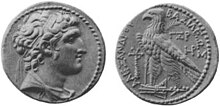Tyrian shekel


Tyrian shekels, tetradrachms, or tetradrachmas were coins of Tyre.
Description
[edit]They also bore the Greek inscription ΤΥΡΟΥ ΙΕΡΑΣ ΚΑΙ ΑΣΥΛΟΥ (Týrou hierâs kai asýlou, 'of Tyre the holy [city] and [city] of refuge').[1] The coins were the size of a modern Israeli half-shekel and were issued by Tyre, in that form, between 126 BC and AD 56. Earlier Tyrian coins with the value of a tetradrachm, bearing various inscriptions and images, had been issued from the second half of the fifth century BC.[2]
After the Roman Empire closed down the mint in Tyre, the Roman authorities allowed the Jewish rabbanim to continue minting Tyrian shekels in Judaea, but with the requirement that the coins should continue to bear the same image and text to avoid objections that the Jews were given autonomy.[3] They were replaced by First Jewish Revolt coinage in 66 AD.
The Tyrian shekels were considered tetradrachms by the Greeks, as they weighed four Athenian drachmas, about 14 grams [citation needed], more than earlier 11-gram shekels but regarded as equivalent for religious duties at that time.[4]
Metallurgical studies[5] have demonstrated that Tyrian shekels maintained an exceptionally high silver content throughout their entire production period, with a purity level approaching 94-97%. This remarkable consistency in metal quality distinguished them from other ancient silver coins. The exceptional purity helps explain why the Jerusalem Temple priests specifically required Tyrian shekels for Temple tax payments.
The money-changers referenced in the New Testament Gospels (Matt. 21:12 and parallels) provided Tyrian shekels in exchange for Roman currency when this was required.[6][7]
See also
[edit]- History of currency
- List of historical currencies
- Shekel
- Carthaginian shekel, generally roughly half a Tyrian shekel
- Jerusalem shekel
- Bar Kochba shekel
References
[edit]- ^ "Tyrian Shekel".
- ^ Historia numorum: a manual of Greek numismatics. Syria, &c.
- ^ "Jerusalem's Tyrian Shekels: a lesson in priorities".
- ^ "Ancient Jewish Coins Related to the Works of Josephus". Archived from the original on 2005-02-16., citing David Hendin's Guide to Biblical Coins and Y. Meshorer's Ancient Jewish Coinage.
- ^ "Why Did the Priests in Jerusalem Favor the Tyrian Shekel? The Metallurgical Testimony".
- ^ "The role of coins in the First Revolt". Archived from the original on 2008-10-29.
- ^ "Israel photos III".
